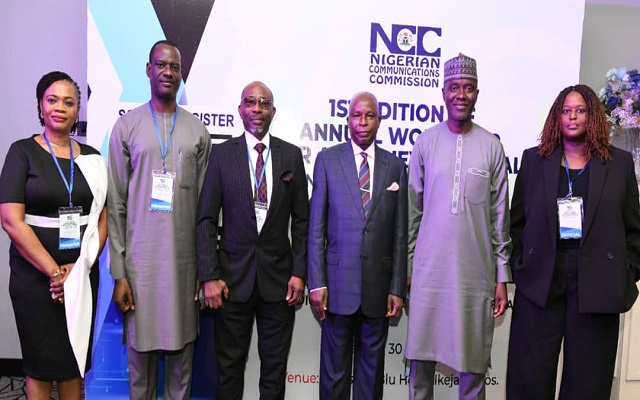At the opening of the maiden edition of the Nigerian Communications Commission’s (NCC) Annual Workshop for Attorneys-General, key government leaders have jointly called for deeper collaboration between federal and state actors to strengthen the regulatory framework for Nigeria’s rapidly evolving communications sector.
The two-day event, held at the Sheraton Hotel in Ikeja, Lagos, brought together Attorneys-General from across the country to deliberate on the theme: “Building and Driving Synergy in Regulating Communications for the Digital Transformation of Nigeria.”
The workshop is designed to foster policy coherence, streamline legal frameworks, and address pressing challenges in the telecommunications industry.
In his keynote address, the Attorney-General of the Federation and Minister of Justice, Lateef O. Fagbemi, SAN, emphasized that digital transformation is not only crucial for innovation but also for Nigeria’s broader socio-economic development.
He underscored the role of a well-regulated communications sector in ensuring data privacy, consumer protection, and an environment conducive to business growth, and praised the NCC for its foresight in convening the workshop, which he described as a vital step in bridging knowledge gaps between legal officers and regulators.
Fagbemi warned, however, that persistent challenges continue to undermine progress in the sector. These include multiple taxation across government tiers, vandalism of telecom infrastructure, regulatory overlaps, and inconsistent right-of-way policies by states.
Citing specific incidents, such as the 2024 taxation conflict in Ogun State and the 2023 base station vandalizations in Kano, he described such setbacks as acts of economic sabotage that threaten Nigeria’s digital future.
To address these issues, the Minister called for a coordinated approach involving the executive, legislature, and judiciary.
He advocated for harmonized legal and policy frameworks, the creation of a federal-state regulatory coordination forum, a unified right-of-way policy, joint enforcement of infrastructure protection laws, and a consolidated digital taxation structure.
He also charged Attorneys-General to be proactive in advising their respective governments on digital economy policies, and to lead efforts in upholding data privacy, cybersecurity, and alternative dispute resolution mechanisms.
Echoing these sentiments, the Executive Vice Chairman and CEO of the NCC, Dr. Aminu Maida, in his opening address, had said that the legal community has a pivotal role to play in shaping a digital economy that is both innovative and inclusive.
He noted that communications regulation in Nigeria has evolved over the years, from liberalizing markets and expanding broadband access, to tackling modern concerns like artificial intelligence governance, cybersecurity, and digital sustainability.
Dr. Maida highlighted the urgent need to reassess the Nigerian Communications Act of 2003, describing it as outdated in light of emerging technologies and evolving digital trends, and also emphasized the importance of addressing the fragmented tax and regulatory landscape that continues to deter private investment in the sector.
Notably, he referenced the 2024 Executive Order by President Bola Ahmed Tinubu, which designated telecommunications infrastructure as Critical National Information Infrastructure (CNII), and called for joint efforts to operationalize this designation in collaboration with the Office of the National Security Adviser.
According to Maida, the NCC is committed to working with state governments, lawmakers, and the justice sector to align regulatory actions with national development goals, and described the workshop as more than a one-off gathering, expressing his hope that it would become an annual platform for knowledge exchange, legal innovation, and joint problem-solving.
As Nigeria races toward deeper digital integration powered by high-speed connectivity, AI, and the Internet of Things, both Fagbemi and Maida warned that the regulatory landscape will only grow more complex.
They insisted that only a “Whole-of-Government” approach, anchored on synergy between institutions at all levels, can ensure a resilient, efficient, and investor-friendly communications ecosystem.
The workshop continues through July 31, with participating Attorneys-General expected to explore pathways for policy alignment and recommend frameworks that will support a more integrated and effective regulation of Nigeria’s digital and communications sector.

